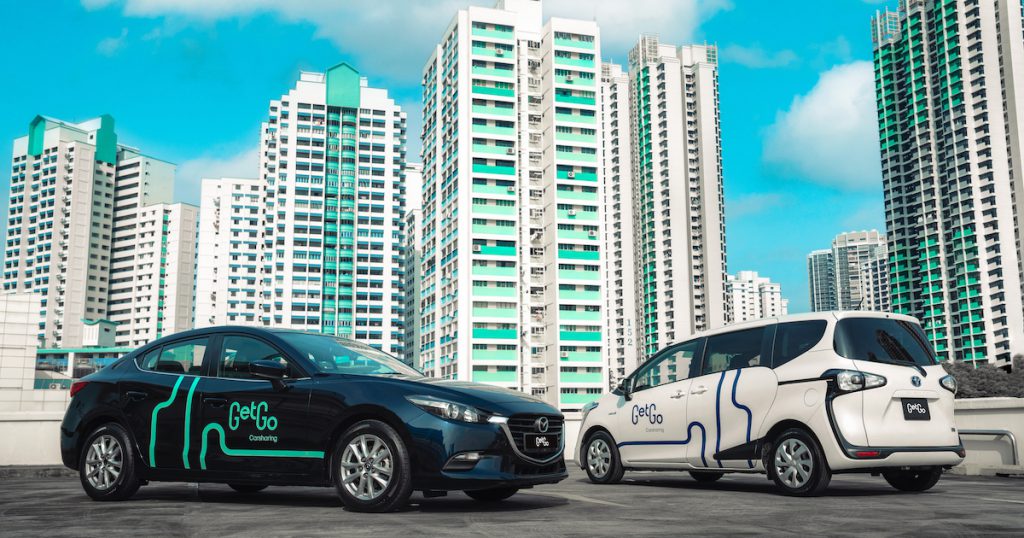[Update: 29 April]
Singapore’s newest car-sharing player GetGo has gained rapid traction since its launch less than two months ago, attracting more than 20,000 users.
At launch, it hailed itself as “Singapore’s simplest, most flexible, and most accessible car-sharing service.”
This is evident from GetGo’s charging policy. Other existing car-sharing companies require either a cash deposit or prepaid credit top-ups, and there are also some who charge membership fees.
Unlike the rest, GetGo decided to do away without these. It’s breaking new ground with no deposits and no membership fees, and a fully Pay-As-You-Go policy.
GetGo cited two reasons for this move: they want to give users’ the peace of mind that their monies are not unnecessarily held by the company, and to make the service as flexible and as accessible as possible.
“This enhancement further eliminates the need for pre-booking holds (which could add up for frequent users), and users will only be charged for the fees they have incurred,” said GetGo.

So how does the new policy work?
Upon confirming the booking, GetGo users will be charged the time charge based on the length of booking. Once the booking is completed, the user will be charged based on the mileage driven. This means that users get to pay exactly for what they have used.
You can refer to the breakdown of GetGo’s pricing structure based on time charge and mileage charge below.
—
There are already seven car-sharing players in Singapore and it’s about to get even heated with the entry of a new player GetGo, which launched today (Feb 25).
While newbies may be deterred by how saturated and competitive the market is, Toh Ting Feng, the managing director and co-founder of GetGo, feels that it is a timely launch instead.
“We believe that there is a certain level of awareness and maturity in Singapore regarding car-sharing thanks to our fellow car-sharing operators,” he said.
“With the accelerated changes brought on by COVID-19, we think it is the right time to launch, (in) what we believe is the next evolution of carsharing in Singapore.”
Over 14,000 Registered Users Pre-Launch

When asked about the pre-launch feedback and interest, Ting Feng said that “it has been overwhelming.”
“We had more than 14,000 registered users even before our official launch,” he added.
Beyond the long pre-registration list, GetGo has also built up a social media following of almost 5,000 followers in the span of a few short months.
Building on the strong interest, GetGo conducted a public beta test to get feedback from its early adopters to identify enhancements to improve its service.
The existing car-sharing community has also been extremely supportive towards its upcoming launch with many providing them with locations where they hope to see GetGo cars.
Ting Feng believes that by providing a superior user experience, early users will actively share about its service.
Users can take advantage of their referral scheme, which allows both referrer and new user to receive a S$5 promo code once the latter have completed his/her first booking.
This is part of the company’s multi-pronged customer acquisition strategy, he added.
Eliminating The Cost And Hassle Of Car Ownership
Having observed the car-sharing ecosystem for several years, Ting Feng noted that there is a “clear gap in terms of (car) ownership and (the) desire to drive” in Singapore.
He cited that the country has a private vehicle population (including taxis and private-hire vehicles) of only about 650,000, yet we have a licensed car driving population of more than 2 million.
“Many individuals have the desire to have the freedom to drive. However, buying and owning a vehicle is a heavy financial burden both at the point of purchase (especially with rising COE prices), as well as continued ownership costs (road tax, insurance, parking),” explained Ting Feng.
“Oftentimes, private vehicles are sitting idle at home or at the office, yet many people still bite the financial bullet so that they have the convenience and freedom of a vehicle when they do need it.”

Car-sharing aims to eliminate the cost and hassle of car ownership, while providing the flexibility to drive a car as and when needed.
There is also a growing awareness regarding environmental issues, which gives rise to added impetus to reduce car ownership.
Moreover, the advent of COVID-19 last year has brought about an increased demand for car-sharing. This is because private cars are seen as a safer option to avoid contracting the virus, as opposed to public transportation and ride-hailing.
The work-from-home trend has further accelerated this demand.
“When we looked at the quality of the existing car-sharing services, we felt that we could build a superior service to drive wider adoption of car-sharing, and thus, GetGo was born,” said Ting Feng.
“Our service and platform has been designed and built to tackle specific pain points for existing car-sharing users, and to remove any barriers for potential new adopters. It is our belief that a simple, flexible, and accessible car-sharing service, operated at significant scale, will be a legitimate and serious alternative to car ownership.”
Get Going With GetGo
The GetGo app is free for download on both Apple App Store and Google Play Store.
Unlike most car-sharing services which require a few days for account approval, GetGo users with a SingPass account can sign up for an account and get it approved instantly through the use of MyInfo.
For those who do not have MyInfo or prefer not to use the service, there is a manual sign-up process.
With the app, users can book, unlock and lock the vehicles without the need for an access card or to retrieve a physical key.

Moreover, as all GetGo vehicles feature keyless ignitions, users simply need to push a button to start the engine and drive.
GetGo users need to be at least 19 years old and have at least one year of driving experience with a valid Class 3, 3A, or 3C driving license.
It is worthy to note that GetGo operates on an A-to-A return trip car-sharing model, which allows users to collect and return the vehicle at the same point.
Ting Feng reasoned that “an A-to-B service is not financially viable” without significant operational scale and user adoption. This is evident by the losses incurred by existing A-to-B operators, some of whom unfortunately have had to shut down their operations.
“While GetGo is starting off as an A-to-A service, it is our intent to develop our operational scale, user adoption, partnerships, and technology to a point where an A-to-B service becomes feasible,” he added.
How Much Does It Cost?
GetGo adopts a “pay-as-you-go pricing model”. This means that users are charged after each trip for the duration and mileage charges incurred.

Rental rates for “standard” cars like Honda Shuttle, Toyota Sienta, Mazda 3 and Ssangyong Tivoli starts at S$3 per hour during off-peak periods (12am to 5.59am daily).
The rates can go up to S$9 per hour during peak periods (6pm to 11.59pm on weekdays, as well as 6am to 11.59pm on weekends and public holidays).
Furthermore, GetGo’s entire fleet of vehicles are equipped with advanced telematics which enables predictive maintenance and refueling operations.
Since petrol is taken care of by GetGo, it means that users do not have to pay for petrol and waste time refuelling vehicles for every single trip.
When it comes to encouraging responsible usage, GetGo penalises users who cause inconvenience to other users. They may be fined, or in more severe cases, get banned from using the service.
“Encouraging responsible usage will remain our priority as we want to inculcate good behaviour within the community and as much as possible, avoid having to resort to penalties to maintain community standards,” said Ting Feng.
“By utilising a combination of community reviews and preventive technology, we will be able to identify and dissuade undesirable actions.”
From 400 To 1,000 Cars In 2021

GetGo’s founding shareholders invested a “six-digit figure” to start up the company in August 2020.
With a launch fleet of 400 cars across 300 locations by end March, GetGo hopes to expand the fleet size to 1,000 vehicles across over 600 locations islandwide by 2021.
Its current fleet already has a significant number of hybrid vehicles, but they have plans to “progressively electrify” it.
As such, GetGo is looking at working with more fleet partners, including potential strategic partners, that are keen to provide electric vehicles.
It also plans to work more closely with government agencies and private car park operators to move towards a sustainable model for “free-float”, or a point A-to-B model.
In the long run, Ting Feng said that they aim to “reduce the demand for vehicle ownership by 100,000.”
By taking vehicles off the roads, GetGo aims to help Singapore free up its economic resources for more productive pursuits and protect the environment, in line with the government’s car-lite masterplan.
New GetGo users can get S$5 off their first ride with the code ‘GETGO5OFF’.
Featured Image Credit: GetGo










